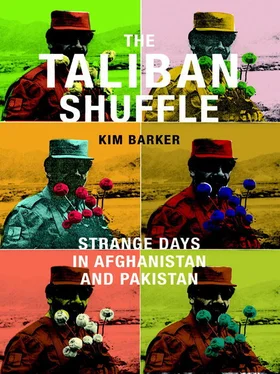“But I’m verified. I told you who I am. I gave you my mother’s maiden name. That’s enough, right?”
“We need your date of birth. That’s the procedure.”
“Um, I don’t think that’s necessary.”
Jeremy looked at me, hearing only my side of the conversation, which in all likelihood sounded strange.
“It is,” the woman said.
I knew if I said my date of birth, my house of fraudulent age-faking cards would come crashing down. Plus Jeremy would know it was my birthday. He was not stupid. This was an I Love Lucy episode. I thought quickly.
“Today,” I told her. I waited briefly, as if she were saying something on the other end of the line. “Yes. But a while ago. A long while ago.”
“Oh, so it is,” the woman said. “I didn’t notice that before. Happy birthday. And what was the year?”
“You need that?”
“We need that.”
“That’s a very good question,” I said. “In fact, I think the correct number you’re looking for is one, nine, seven, zero.”
Smooth. It worked. Jeremy had no idea.
The next day I continued to report my story. At the hot parliament member’s aerobics class, various Afghan women dressed in the same everyday long-sleeved shirts and baggy pants they wore underneath their burqas or black abayas. There was no such thing yet as workout gear for women in Afghanistan, although one standout young woman had somehow managed to get her hands on a sweatshirt. The power went out. The exercise routine made the Sit and Be Fit workout program for seniors in the United States look extreme.
When I met Jeremy at the end of the day, I heard the news that three bombs had gone off in Delhi, at markets where I had shopped, killing more than sixty people. I was seriously out of position. I called my bosses and told them I was already in Afghanistan. I felt guilty for putting my personal life ahead of work, even slightly. It affected our night—I was distracted by bomb blasts a country away.
I left for Kabul the next day, saying an awkward goodbye.
“Thanks for coming to visit,” he said.
“Well, my bosses wanted a story, so it worked out,” I replied. Even then, it was difficult to be honest.
We saw each other a week later, as he passed through Kabul on his way out of the country for vacation, for lunch at the Flower Street Café, a sandwich shop that was relatively private. We held hands beneath the table and kissed goodbye quickly in the path leading toward the front gate, pulling away when an Afghan waiter walked past. Neither one of us necessarily wanted anyone else to know that we were attempting to date. Kind of. We spoke in staccato sentences with abrupt punctuation, not wanting to reveal too much, or ask for too much.
“It’s been really nice getting to know you,” I said.
“Well. You know. I don’t want anything serious. I mean—I’m not—you don’t think—”
“Of course!” I interrupted. “You know. I just. Well, I don’t want anything serious. Obviously. But it’s nice, you know.”
“Well—yeah. I like hanging out. We’ll see what happens.”
“Totally. Have a great vacation.”
Seventh grade. Kabul was a fishbowl and not conducive to actual dating, even though the foreign women were vastly outnumbered by the foreign men. Our attractiveness rate skyrocketed accordingly. A ten in Kabul became a five as soon as she walked off the plane in Dubai. We were Kabul Cute, we were Mission Pretty. But still, the men here rarely asked the women out on actual dates—in that, Jeremy was an anomaly. Most of the attempts at mating involved bad tongue action and groping near or inside the bathrooms at L’Atmosphère.
We were a function of our environment. For many, life was a pressure cooker, going from home to office to restaurant, rarely being outside, and the only release was liquor, was parties, was dancing to the same soundtrack, week after week—“Hips Don’t Lie,” “Crazy in Love,” “Don’t Cha,” and “Let’s Get Retarded.” (In my nightmares, I can still hear that song list, over and over.) By this point, the social scene resembled a cross between a fraternity party and the Hotel California, where the same characters always seemed to stay too long and drink too much, where entertainment occasionally consisted of spelling words on legs with Nair hair-removal cream. The best pool table—or the only one—was at a brothel called Escalades. The disco Coco Cabana had opened a few months earlier but had rapidly turned into a seedy joint featuring alcohol-fueled grope-fests. The Elbow Room resembled a homey ski lodge, featuring a bar and a fireplace; Thai and Italian restaurants promised bad lighting and chilled red wine. A few thousand foreigners lived in Kabul, and even though many of them never went out at night, enough did to justify a dozen thriving businesses. The expatriate scene of Kabul even had its own magazine —Afghan Scene —that included articles and pictures of people at various parties, in various states of inebriation. (To be fair, money from magazine sales helped street kids.)
At this point, prostitutes seemed more in danger of taking over Kabul than the Taliban. Brothels came and went—the Lighthouse, the Tree House, Escalades, the Disco Restaurant, Bobo’s, Ching Ching (a so-called Chinese “restaurant” that advertised something called “mosic”). These brothels, mostly staffed with women from China or one of the former Soviet republics, had blossomed in Kabul like poppy farms after the Taliban’s fall, even though they were theoretically illegal and catered mainly to the security and contractor communities. Enforcement was spotty. A quixotic Afghan lawyer in a cape would raid one brothel. The poor women would then be bundled up and shipped back to their native country, only to be replaced by another brothel in another two-story house with new Chinese women who barely spoke English and did not speak the local languages at all. In some ways, these women in thigh-high boots and fishnet stockings were much like the Taliban-led militants—a flexible cast of characters who would be somehow eliminated and then replaced by others. A ready supply of bodies always existed for war and sex.
Often, the reality of Afghanistan interrupted the fun. A security guy shot up a bar; an attention-seeking journalist tossed a stun grenade at a party, blowing out all the windows. A consultant company threw a dance and trampoline party with camels and actual Afghan nomads—a measure of authenticity, I guess, that had become legendary with Afghan nomads, who spread rumors across the region of a foreigner trampoline orgy. A rooftop party at the Mustafa Hotel the year before had been interrupted by three rockets overhead, but only slightly, as the revelers, one in a pink feather boa, waved their hands in the air and started to cheer. A toga party two months earlier was cut short by a power outage and generator failure. At that party, most people dressed in white sheets, looking regal and even arranging leaves in their hair. Mindful of how it would look to be killed at a toga party in Kabul, I had opted for compromise—I went, but wore jeans and a pink Puma T-shirt, the Afghan equivalent of wearing clean underwear in case you’re run over by a bus. My friend, who worked for Human Rights Watch, had declined his invitation. “Human Rights Watch does not do toga parties in Kabul,” he said, and he had a point.
The brothels and over-the-top parties were only a symptom of the absurdity that this war had turned into by the fall of 2005. Foreign aid levels were at record lows compared to the money given per capita to the relatively advanced countries of Bosnia and East Timor, but still, billions of new dollars had poured in, which should have accomplished something significant. Yet no one seemed to be coordinating which money went where. There was duplication, repetition. The capital still had little electrical power, maybe a few hours a day, and many roads that were more pothole than pavement. The country still had relatively few international troops, and of those, some, like the Germans, weren’t allowed to patrol after dark. (During the day, they traveled around with an ambulance.) The Afghan government seemed about as effective as a student council, and no one in the international community seemed to pay much attention to what was happening across the border in Pakistan.
Читать дальше











